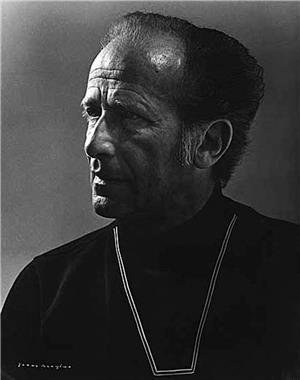On February 7, 1954, the Seattle Symphony Orchestra announces that famed conductor Milton Katims (1909-2006) has been engaged to lead the 1954-1955 concert season. Katims gained his high-profile reputation via national broadcasts by the NBC Orchestra (1943-1954) and his viola work with the esteemed New York Quartet and the Budapest Quartet. Local supporters of the arts are excited that, as of today, Katims has committed to conducting here for a full season.
New Meanings for "Long Hair" Music
Maestro Katims originally came to Seattle to guest-conduct a series of three special concerts that began on November 17, 1953. So popular were those shows that the local newspaper's music critics immediately began clamoring for the symphony to make efforts to hire Katims permanently.
Katims won over his audiences, in part, by displaying a fresh approach and ready willingness to present musical selections that weren't strictly from the "long hair" classical realm. Over the years these concerts included a musical take on T. S. Eliot's "The Practical Cats," the highlighting of works by local composers, a series dedicated to up-and-coming "Stars of the Future," a swing jam with Benny Goodman, and even a collaboration with Seattle's premier 1960s psychedelic Light Show crew, the Retina Circus.
But even Katims's choice of classical pieces was inspiring, and he often managed to provide pleasant surprises as in the time he conducted Camille Saint-Saens's "Carnival of Animals" -- with an assist from the renowned director of the University of Washington School of Drama, Glenn Hughes, narrating verses as written by Ogden Nash.
Separation Anxiety
In December 1957, rumors broke that Katims might leave Seattle to accept an offer elsewhere. One letter to an editor fretted, "If we lose Mr. Katims, Seattle will become a firstclass musical dump. What orchestra leaders would want to come here when we show so little regret over losing the best? Our new concert hall will be like the proverbial barn after the horse is stolen" (Campbell, 114). Luckily, the town so taken with the charismatic conductor had in turn charmed Katims, and on January 7, 1958, he announced that he would be staying on.
One event mounted to mark the Grand Opening of Seattle's 1962 World's Fair was the "World's Fair Gala," an April 21st concert that featured famed pianist, Van Cliburn (1934-2013), and Katims's symphony at the brand new Opera House. In June, Katims led the symphony in their opera debut, performing Giuseppe Verdi's classic Aida.
The End of an Era
Every orchestra eventually reaches a point when it must consider changing its leadership. Bringing in new people with new ideas and approaches can be a very energizing step -- however, it must be done with great concern and care for the outgoing person's feelings.
The forced exit of the very popular Katims from his position was not the symphony's finest hour. It was in 1973 that the board of trustees suddenly decided to replace Katims as Musical Director and offer him instead a new role as Conductor Emeritus. Instead, after negotiations, Katims signed a five-year contract in July 1974, that allowed him to retain his position through 1976 (when he would be replaced by Maestro Rainer Miedel) and take on a new role that carried the rather diminished title of Music Advisor.
Katims' Return to the Podium
Long-time Seattle arts patrons Hans and Thelma Lehmann felt that "After Katims' retirement, the cruelest and most unusual punishment meted out to him was that the Symphony never asked or permitted him to conduct on even one single occasion the orchestra that he had built up and conducted perhaps over 1,000 times."
That institutional slight was ultimately made right in April 1992. It was a celebration of the 30th anniversary of the World's Fair's (and the Opera House and the Seattle Center) that finally caused the symphony to reach out to Katims once again, as the Lehmanns noted: "Thanks to new leadership and the graciousness of our new musical director, Gerard Schwarz, Milton Katims was invited to conduct a benefit concert for the orchestra which resulted in a triumphal event for Katims, Schwarz, the Symphony and, above all, for Seattle."
Milton Katims died of heart failure on February 27, 2006, at the age of 96.

